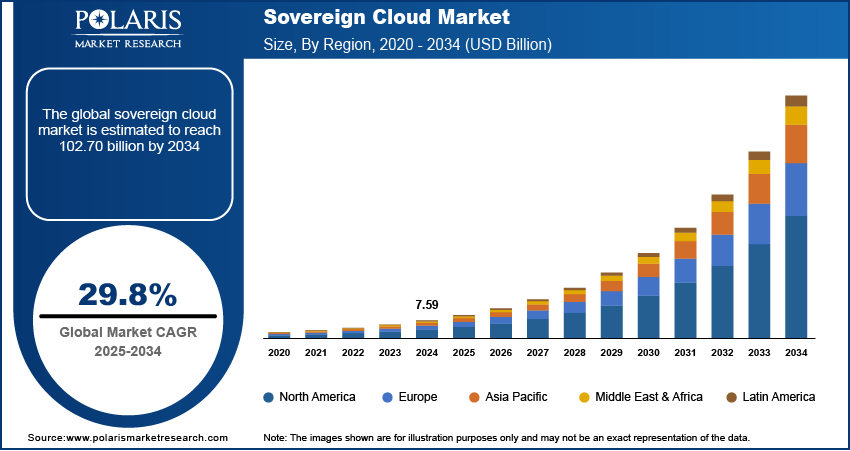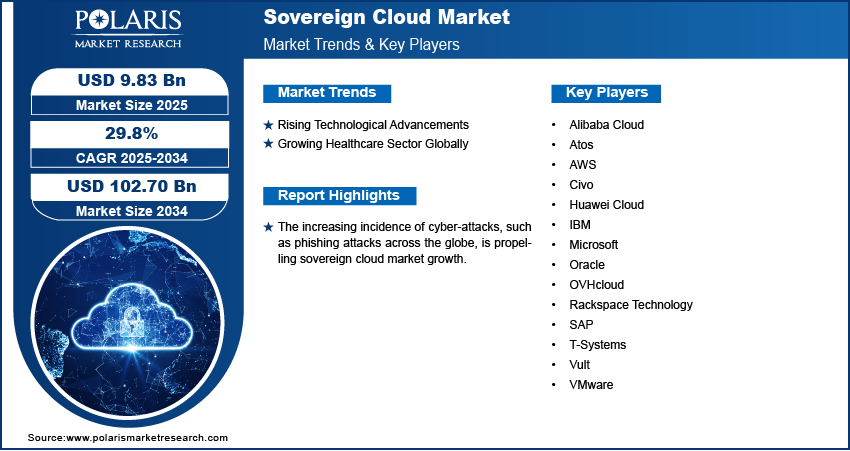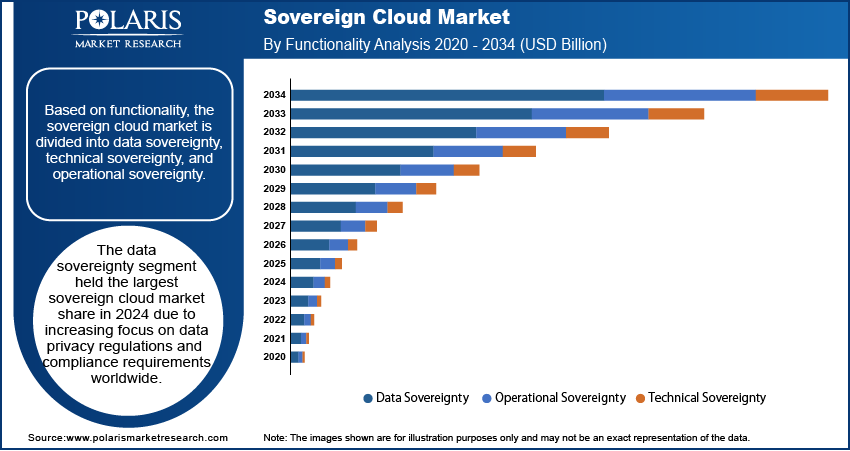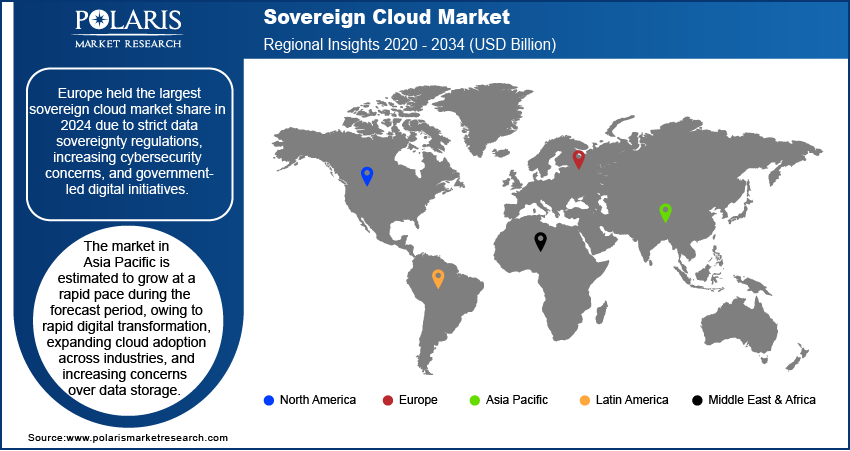
Sovereign Cloud Market Size, Share, Trends, Industry Analysis Report: By Functionality (Data Sovereignty, Technical Sovereignty, and Operational Sovereignty), Deployment Mode, Industry Vertical, and Region (North America, Europe, Asia Pacific, Latin America, and Middle East & Africa) – Market Forecast, 2025–2034
- Published Date:Apr-2025
- Pages: 129
- Format: PDF
- Report ID: PM5493
- Base Year: 2024
- Historical Data: 2020-2023
Sovereign Cloud Market Overview
The global sovereign cloud market size was valued at USD 7.59 billion in 2024. The market is projected to grow from USD 9.83 billion in 2025 to USD 102.70 billion by 2034, exhibiting a CAGR of 29.8% during 2025–2034.
A sovereign cloud is a cloud computing environment designed to meet the stringent requirements of digital sovereignty, ensuring that organizations maintain control over their data, applications, and infrastructure within specific geographical boundaries. Sovereign cloud is crucial for governments, enterprises, and institutions that need to comply with local regulations and laws regarding data privacy, residency, and security. Sovereign clouds are typically hosted and managed within the borders of the country they serve, ensuring that sensitive data remains under local control and adheres to national laws. The primary purpose of a sovereign cloud is to address the challenges posed by traditional cloud services, which often operate across multiple jurisdictions, potentially compromising data sovereignty. Sovereign clouds encompass three key areas: data sovereignty, operational sovereignty, and technical sovereignty.
The increasing incidence of cyber-attacks, such as phishing attacks across the globe, is propelling sovereign cloud market growth. For instance, Anti-Phishing Working Group published a report stating that 932,923 phishing attacks were recorded in Q3, 2024, up from 877,536 in the second quarter. Cyber-attacks, including phishing attacks, often bypass traditional security measures, making it essential for businesses to adopt more secure cloud infrastructures that comply with local data protection regulations. Sovereign cloud solutions provide a trusted environment where organizations store and process data with enhanced security measures, reducing exposure to cyber threats. Phishing attacks have further become more sophisticated, targeting employees through deceptive emails and fraudulent websites. Sovereign cloud solutions help mitigate these risks by offering region-specific security policies, encryption methods, and controlled access measures that align with regulatory requirements. Therefore, the demand for sovereign cloud is increasing with the rising incidence of cyber-attacks.

To Understand More About this Research: Request a Free Sample Report
The sovereign cloud market demand is driven by increasing digitalization in emerging nations. Digitalization leads to growing concerns about data privacy, security, and compliance with regulations. Sovereign cloud addresses these issues by providing a secure and compliant environment for storing and processing data. The surge in digitalization also highlights cybersecurity threats and geopolitical tensions, which further drive the need for sovereign cloud solutions. Organizations seek to protect their sensitive data from unauthorized access, especially from foreign governments or malicious actors. Sovereign cloud providers offer transparency and control over data management, which helps build trust. Moreover, the increasing digitalization of business processes and services necessitates robust data protection and compliance measures. Sovereign cloud solutions enable companies to meet compliance requirements, which increases their adoption. Therefore, with the increasing digitalization in emerging nations, the demand for sovereign cloud is also rising.
Sovereign Cloud Market Dynamics
Growing Healthcare Sector Globally
Healthcare organizations handle vast amounts of sensitive patient data, including medical records, personal information, and financial details. Sovereign cloud solutions ensure that this data remains within the borders of a specific country or region, adhering to strict data sovereignty laws and regulations. Governments and healthcare regulators further emphasize data sovereignty to safeguard patient privacy and national healthcare data. Many countries enforce strict laws, such as the Health Insurance Portability and Accountability Act (HIPAA) in the US and the General Data Protection Regulation (GDPR) in Europe, requiring healthcare providers to manage patient data securely and within national borders. Sovereign cloud solutions help healthcare organizations meet these regulatory demands while reducing risks associated with cross-border data transfers. The increasing adoption of telemedicine and digital healthcare services further drives the need for sovereign cloud infrastructure. As global healthcare spending increases the demand for sovereign cloud solutions is also rising during the forecast period. For example, health spending in the US grew by 4.1% in 2022, reaching USD 4.5 trillion, according to the American Medical Association. This rising investment in healthcare highlights the growing need for advanced data security solutions like sovereign cloud.
Rising Technological Advancements
Technological advancements such as artificial intelligence (AI), machine learning (ML), the Internet of Things (IoT), and big data analytics generate and process massive amounts of data. Sovereign cloud platforms provide the necessary infrastructure to store and manage this data while ensuring it remains within specific geographic boundaries, adhering to data sovereignty regulations. Moreover, the proliferation of IoT devices across industries, from smart cities to industrial automation, generates continuous streams of data that need secure and efficient processing. Sovereign cloud solutions offer the scalability and low-latency capabilities required to handle IoT data while maintaining data sovereignty. Thus, with the growing advancement in technology, the sovereign cloud market demand is rising.

Sovereign Cloud Market Segment Insights
Sovereign Cloud Market Evaluation by Functionality
Based on functionality, the sovereign cloud market is divided into data sovereignty, technical sovereignty, and operational sovereignty. The data sovereignty segment held the largest sovereign cloud market share in 2024 due to increasing focus on data privacy regulations and compliance requirements worldwide. Governments and businesses have prioritized local data storage and processing to align with regulations such as the General Data Protection Regulation (GDPR) in Europe, the Cloud Act in the US, and similar data protection laws in Asia and the Middle East. Companies operating in highly regulated industries, including finance, healthcare, and government services, rely on data sovereignty to maintain strict control over sensitive information and prevent unauthorized cross-border data transfers. The rise in cyber threats, geopolitical tensions, and concerns over foreign surveillance has further driven organizations to implement data sovereign cloud solutions that ensure data remains within national or regional jurisdictions. The need for enhanced security, regulatory compliance, and risk mitigation have also played a crucial role in the widespread adoption of the data sovereignty segment.
Sovereign Cloud Market Insight by Industry Vertical
In terms of industry vertical, the sovereign cloud market is segregated into government & defense, healthcare, BFSI, telecommunications, energy & utilities, manufacturing, and others. The BFSI segment is expected to grow at a robust pace in the coming years owing to the stringent regulatory requirements and increasing concerns over financial data security. Financial institutions are estimated to continue to generate vast amounts of sensitive customer information, requiring secure and compliant cloud solutions to prevent data breaches and fraud. Regulatory bodies across regions, including the European Banking Authority (EBA), the Monetary Authority of Singapore (MAS), and the US Securities and Exchange Commission (SEC), have introduced stringent guidelines mandating financial institutions to ensure data sovereignty and security. The rapid adoption of digital banking, fintech innovations, and AI-driven financial services further amplifies the need for resilient and compliant cloud infrastructure. Additionally, the growing reliance on real-time payment processing, blockchain-based transactions, and advanced fraud detection systems strengthens the demand for sovereign cloud solutions that provide data control, regulatory compliance, and enhanced cybersecurity measures.

Sovereign Cloud Market Regional Analysis
By region, the sovereign cloud market report provides insights into North America, Europe, Asia Pacific, Latin America, and the Middle East & Africa. Europe held the largest sovereign cloud market share in 2024 due to strict data sovereignty regulations, increasing cybersecurity concerns, and government-led digital initiatives. The European Union (EU) has enforced stringent laws such as the General Data Protection Regulation (GDPR) and the European Data Act, compelling organizations to store and process data within the region, thereby boosting demand for sovereign cloud. The Gaia-X initiative, a collaborative project aimed at establishing a secure and federated data infrastructure for Europe, has further accelerated the adoption of sovereign cloud. Industries such as banking, healthcare, and government services have invested heavily in sovereign cloud platforms to protect sensitive data and mitigate risks associated with foreign access and cyber threats. Germany dominated the market within the region due to its proactive regulatory stance, strong industrial base, and significant investments in secure cloud infrastructure.
The market in Asia Pacific is estimated to grow at a rapid pace during the forecast period, owing to rapid digital transformation, expanding cloud adoption across industries, and increasing concerns over data storage. Governments in countries such as China, India, and Australia have implemented strict data protection laws that require businesses to store and manage data within national borders, driving demand for sovereign cloud. China is projected to hold a major market share within the region due to its robust regulatory framework, including the cybersecurity law and data security law, which mandate stringent data sovereignty measures. The country’s focus on self-sufficiency in cloud technology, supported by state-backed cloud initiatives, strengthens its position in the market. Additionally, the rapid growth of financial services, e-commerce, and artificial intelligence applications in the region further increases demand for sovereign cloud solutions that offer regulatory compliance, enhanced security, and localized data control.

Sovereign Cloud Market – Key Players and Competitive Insights
The competitive landscape features global leaders and regional players competing for sovereign cloud market share through innovation, strategic alliances, and regional expansion. Global players utilize strong R&D capabilities, technological advancements, and extensive distribution networks to deliver advanced solutions, meeting the growing demand for disruptive technologies and sustainable value chains. Sovereign cloud market trends highlight rising demand for emerging technologies, digitalization, and business transformation driven by economic growth, geopolitical shifts, and macroeconomic trends. Global players focus on strategic investments, mergers and acquisitions, and joint ventures to strengthen their market position. Post-merger integration and strategic alliances are key strategies to improve competitive positioning and expand regional footprints. Regional companies, meanwhile, address localized needs by offering cost-effective solutions and leveraging economic landscapes. Competitive benchmarking includes market entry assessments, expansion opportunities, and partnership ecosystems to meet the demand for innovative products and future-ready solutions.
The market is experiencing technological advancements, such as disruptive technologies and digital transformation, reshaping industry ecosystems. Companies are investing in supply chain management, procurement strategies, and sustainability transformations to align with sovereign cloud market demand, and future development strategies. Pricing insights, revenue growth analysis, and competitive intelligence are critical for identifying opportunities and driving long-term profitability. In conclusion, the growth of the sovereign cloud market is fueled by technological innovation and regional investments. Major players emphasize strategic developments and market adaptability to navigate economic changes, ensuring sustained growth in a competitive global market. The sovereign cloud market is fragmented, with the presence of numerous global and regional market players. Major players in the market are Alibaba Cloud, Atos, AWS, Civo, Huawei Cloud, IBM, Microsoft, Oracle, OVHcloud, Rackspace Technology, SAP, T-Systems, Vultr, and VMware.
SAP sovereign cloud is a specialized cloud service designed to meet the stringent security, compliance, and data sovereignty requirements of organizations operating in regulated environments. It addresses the growing need for secure and localized cloud solutions, particularly for industries such as government, defense, and critical infrastructure. SAP’s approach to sovereign cloud emphasizes four dimensions: data sovereignty, operational sovereignty, legal sovereignty, and technical sovereignty. SAP’s sovereign cloud portfolio includes Infrastructure-as-a-Service (IaaS), Platform-as-a-Service (PaaS), and Software-as-a-Service (SaaS) offerings, with solutions such as SAP S/4HANA Cloud Private Edition, SAP SuccessFactors, and SAP Analytics Cloud. These services are designed to comply with country-specific standards for data residency, security accreditation, and regulatory compliance.
Vultr Sovereign Cloud and Private Cloud are innovative solutions that cater to governments, research institutions, and enterprises, requiring secure and localized cloud infrastructure to manage sensitive data within national borders. Vultr’s Sovereign Cloud ensures that critical data remains domestically stored and adheres to regional laws while also providing advanced features such as air-gapped deployments and dedicated control planes. Vultr aims to reduce reliance on these large tech companies by deploying sovereign clouds on demand in collaboration with local telecommunications providers and government bodies.
List of Key Companies in Sovereign Cloud Market
- Alibaba Cloud
- Atos
- AWS
- Civo
- Huawei Cloud
- IBM
- Microsoft
- Oracle
- OVHcloud
- Rackspace Technology
- SAP
- T-Systems
- Vultr
- VMware
Sovereign Cloud Industry Developments
March 2025: E2E Cloud announced the launch of its Sovereign Cloud Platform to give enterprises, governments, and data centers full control over their digital infrastructure. The platform addresses growing concerns around data sovereignty.
December 2024: Civo, the company reimagining cloud computing, announced the launch of its new Indian sovereign cloud, based in Mumbai, Maharashtra.
November 2024: SAP SE announced the general availability of its Sovereign Cloud capabilities in the UK to provide secure, localized cloud solutions tailored to the unique needs of public sector organizations, critical national infrastructure, and highly regulated industries.
April 2024: Vultr, one of the world’s largest privately-held cloud computing platforms, announced the launch of Vultr Sovereign Cloud and Private Cloud in response to the increased importance of data sovereignty and the growing volumes of enterprise data being generated.
Sovereign Cloud Market Segmentation
By Functionality Outlook (Revenue, USD Billion, 2020–2034)
- Data Sovereignty
- Technical Sovereignty
- Operational Sovereignty
By Deployment Mode Outlook (Revenue, USD Billion, 2020–2034)
- Fully Managed Sovereign Cloud
- Hybrid Sovereign Cloud
- On-Premises Sovereign Cloud
By Industry Vertical Outlook (Revenue, USD Billion, 2020–2034)
- Government & Defense
- Healthcare
- BFSI
- Telecommunications
- Energy & Utilities
- Manufacturing
- Others
By Regional Outlook (Revenue, USD Billion, 2020–2034)
- North America
- US
- Canada
- Europe
- Germany
- France
- UK
- Italy
- Spain
- Netherlands
- Russia
- Rest of Europe
- Asia Pacific
- China
- Japan
- India
- Malaysia
- South Korea
- Indonesia
- Australia
- Vietnam
- Rest of Asia Pacific
- Middle East & Africa
- Saudi Arabia
- UAE
- Israel
- South Africa
- Rest of Middle East & Africa
- Latin America
- Mexico
- Brazil
- Argentina
- Rest of Latin America
Sovereign Cloud Market Report Scope
|
Report Attributes |
Details |
|
Market Size Value in 2024 |
USD 7.59 billion |
|
Market Size Value in 2025 |
USD 9.83 billion |
|
Revenue Forecast by 2034 |
USD 102.70 billion |
|
CAGR |
29.8% from 2025 to 2034 |
|
Base Year |
2024 |
|
Historical Data |
2020–2023 |
|
Forecast Period |
2025–2034 |
|
Quantitative Units |
Revenue in USD billion and CAGR from 2025 to 2034 |
|
Report Coverage |
Revenue Forecast, Market Competitive Landscape, Growth Factors, and Trends |
|
Segments Covered |
|
|
Regional Scope |
|
|
Competitive Landscape |
|
|
Report Format |
|
|
Customization |
Report customization as per your requirements with respect to countries, regions, and segmentation. |
FAQ's
The global sovereign cloud market size was valued at USD 7.59 billion in 2024 and is projected to grow to USD 102.70 billion by 2034.
The global market is projected to grow at a CAGR of 29.8% during the forecast period.
Europe had the largest share of the global market in 2024
Some of the key players in the market are Alibaba Cloud, Atos, AWS, Civo, Huawei Cloud, IBM, Microsoft, Oracle, OVHcloud, Rackspace Technology, SAP, T-Systems, Vult, and VMware.
The data sovereignty segment dominated the sovereign cloud market revenue in 2024.
The BFSI segment is expected to grow at the fastest pace in the coming years.
